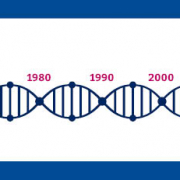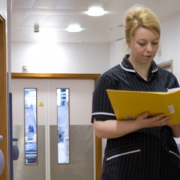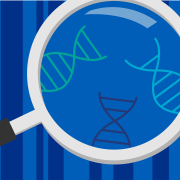Professional journeys into genomics: Delving deeper
In the second part of our blog series for this year’s Genomics Conversation, our group of NHS healthcare professionals explains the power of genomics education in their practice
For many healthcare professionals who develop an interest in genomics, it can be difficult to know how to go about building a knowledge base. For this second part of our blog series, we asked our group of five NHS healthcare professionals how they kickstarted their genomics education and how it has changed the way they approach their day-to-day clinical work.
Catch up on part one of our blog series.
“I felt very isolated. There was no direct training.”
Dr Bernadette Khodaghalian originally specialised in paediatrics, but has just finished her training in inherited cardiac conditions. She credits her genomics journey to a clinical geneticist colleague who, on learning that she was interested in genomic medicine, took the time to sit with her and explain what help was out there. “She directed me to some free resources through the Genomics Education Programme, some free online modules, all of which I did,” says Bernadette. “Then she told me that there was funding to take it further and do the Master’s [in Genomic Medicine]. I really have a lot of gratitude for that person, because she helped me to get on to the right path. Ultimately, I ended up doing the Master’s over two years whilst working full time. I had [it] entirely funded, and that saved me almost £15,000.”
Cardiology registrar Dr Tobi Soge also completed the Master’s in Genomic Medicine – and had no idea that funded places were available when he originally applied. “I did a free online course that was created by the Genomics Education Programme, and then I did my Master’s at Birmingham,” he recalls. “I was planning to pay for it out of pocket, but the university sent me an email to ask whether I was applying for funding. I was like, ‘What? What are you talking about?’ They sent me a link and I got full funding.”
Jessica Keen, a practising pharmacist and pharmacy lead at the North West Genomic Medicine Service Alliance, was also taken by surprise. “I think I was Googling,” she says, “and I must have just typed in ‘Master’s genomics’ to see if it was a thing, and I found the Genomics Education Programme website, and it turned out they were paying for it for NHS staff – at which point I thought, ‘It [genomics] must be important if the NHS is funding staff to do these modules. That wouldn’t happen lightly, this is obviously going to be a growing area.’”
For Amy Roberts, a Lynch syndrome specialist nurse, genomics education has been less formal and more difficult to access. “I felt very isolated,” she admits. “There was no direct training, it was very much like I needed to find the resources myself and suss it out myself. There’s the Royal Marsden, they have a great resource on Lynch syndrome – but apart from that, I felt that everything was very bitty.”
“My job is to mainstream … [It] totally brings down that waiting list for clinical genetics.”
Amy’s role has been created with the express purpose of furthering the NHS’ goal of mainstreaming genomic medicine into everyday practice. It is part of her trust’s diagnostic pathway to identifying Lynch syndrome cases in patients presenting with either colorectal or endometrial cancer. “95% of people don’t know they’ve got it,” she explains. “So there’s people out there who could potentially be on surveillance.” Previously, patients who were found to be high risk for Lynch syndrome would be referred to clinical genetics services. “The waiting lists were very, very long,” Amy says. “So my job is to mainstream. What that means is that, as part of the cancer pathway, [the affected patient] will be seen by me for genomic testing instead. It’s consent, it’s a blood test, it’s that information and that support network within their hospitals. The results are fast-tracked through a mainstreaming pathway and come straight to me, which totally brings down that waiting time for clinical genetics. It means that the patient doesn’t have to wait as long to find out, ultimately, what the future looks like for them and their family.”
“The primary thing that’s changing is this idea of personalised and precision medicine, which is hugely reliant on this genetic power that we’re now trying to harness.”
What about those healthcare professionals whose roles aren’t specifically designed to tackle mainstreaming? How are they using their genomics knowledge in their day-to-day clinical practice?
“I use it all the time,” says Bernadette. “For me, it’s every day. How we manage our patients, how we diagnose them and how we care for them is changing, and the primary thing that’s changing is this idea of personalised and precision medicine, which is hugely reliant on this genetic power that we’re now trying to harness.”
Tobi also describes using his genomics knowledge on a daily basis. “We’ve got a patient on the ward currently who is just mysterious, no one knows why they’ve got chest pain and recurrent myocarditis,” he says. “I think it might be something genetic. As cardiologists, we’re more than happy to do all the invasive tests but no one would think about [requesting] a genomic test. So I mentioned it [in this case], and colleagues said, ‘OK, let’s send [a sample] for Fabry [disease testing].’ That’s not all I want to look for, but at least it’s a first step.”
“It’s affected me on a personal and professional level quite a lot,” Jessica says of her genomics knowledge. “When I have my clinical role once a week, we will use it routinely for almost every patient we treat. I guess it’s supported me to give extra advice, to just have that enhanced knowledge. It also helps me to understand how genomic testing impacts on the choice of cancer medicines – so we’ve done things like educating others and making sure that other pharmacists are aware of all this.”
As more and more emphasis is placed on the power and potential of genomic medicine across the NHS, the thoughts of those navigating this complex world must surely turn to the future. Join us for the third part of our blog series to find out whether our five healthcare professionals feel optimistic about that future, and what advice they would give to colleagues who want to learn more about genomics.









